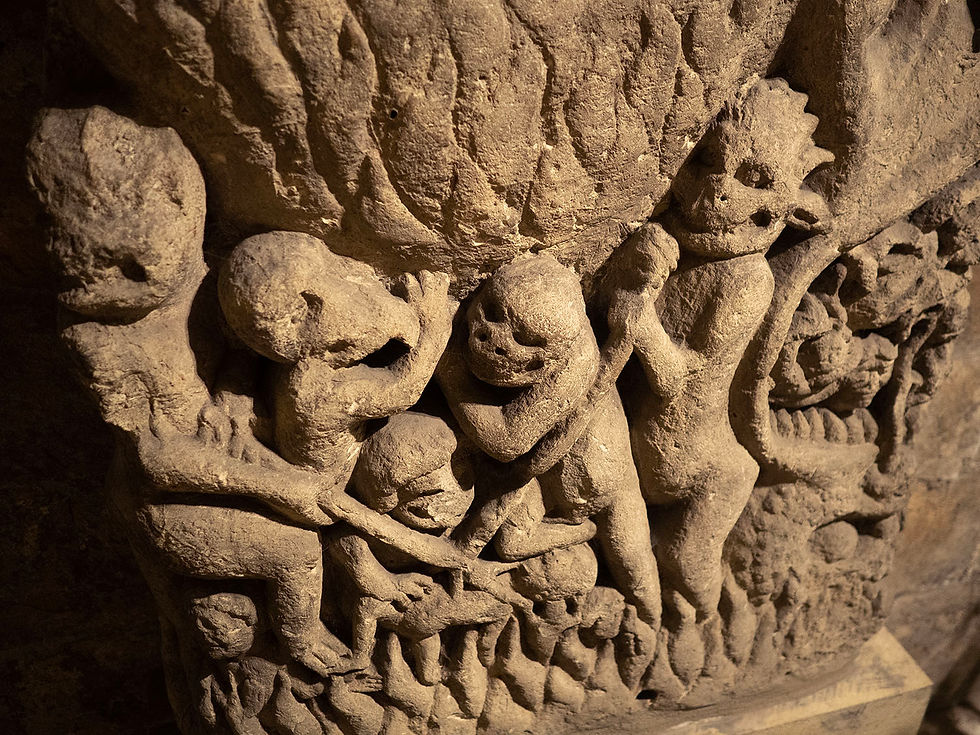Space Chantey and Satire
- Jon Nelson
- Jun 13, 2025
- 4 min read
Updated: Jun 14, 2025

A light post. Space Chantey gets pigeonholed as a sci-fi Odyssey, but that one-liner misses what makes it remarkable. On East of Laughter today, someone suggested that Lafferty set out to satirize heroism but ended up celebrating it instead, if I understood the comment correctly. This is an interesting take. I wonder how common it is.
No one has yet pinned down what Space Chantey is doing, but it is certainly more than a parody of heroism. It's a Menippean satire. Think of it as a literary Trojan horse. It wears the costume of epic, but only to sneak in and thumb its nose at everything from genre conventions to metaphysics. Epic isn't its subject. Epic is the disguise. In this way, it's like Don Quixote, which isn't really about Romance or chivalric culture: it's about the collapse of old values and the impossibility of Romance under new social conditions. Lafferty admires epic, but he also knows that writing one in late modernity is impossible, so he's going to give us picaresque. What Space Chantey goes after is how we tell stories and what we think stories are for.
The most obvious layer of the satire is aimed at the classical source material. The novel has fun with Homer’s Odyssey, as any reader will notice. The land of the Lotus-Eaters becomes “Lotophage,” an exclusive planet where only the beautiful are welcome and the crew is eventually processed into snack chips. The man-eating Laestrygonians are recast as players in a daily “sport fight,” where gruesome death is treated as casual entertainment on live television. This deflates the epic’s foundational status, turning heroic trials into slapstick. The mockery starts on the very first page, where Lafferty parodies the solemn epic invocation—“We give you here, Good Spheres and Cool Boy Conicals…”—blending the voice of the rhapsode with that of a carnival barker. I’ve glossed most of the doggerel to show how central this layer of the text was to Lafferty.
But Lafferty's aim goes beyond the classics, taking swipes at the conventions of genre fiction. This is where things get interesting. Lafferty once said he read genre fiction mainly to learn how to write it; after that, he saw little reason to keep up with the field. In his nonfiction, he often spoke of it with open scorn. Few of his contemporaries were as openly critical of the genre in which they wrote. He brings his deep, pre-genre reading to bear on pulp, which makes Space Chantey, as I see it, an act of genre purgation.
Lafferty skewers the pulp sci-fi obsession with technology through gadgets like "static repulsion" hover slabs, which don't rely on advanced physics but on the user shuffling their feet. The novel slips into Western tall tale territory during a chaotic asteroid episode, having fun with Doc Smith territory. He has fun with cosmic horror tropes from the weird tale tradition, especially in the Siren-Zo episode. One of its sharpest critiques comes in the "Improbable" Club Menitros, a send-up of the Edwardian gentlemen's club story. Lafferty's club is so stringent that even Jorkens would be in trouble. The gambling caper, so popular in the 1960s, gets mocked with the planet Roulettenwelt. Space Chantey? It is a highly compressed genre bomb.
I should also note that the satire operates on a philosophical level, questioning the worldviews that shape our narratives. The novel prompts the reader to reflect on hero worship and militarism, and whether “high deeds” are genuine or merely products to be packaged and sold. Lafferty takes a direct shot at subjective idealism, the Berkeleyan idea that reality exists only when perceived, through the character of Atlas, who believes the universe is a product of his own mind. This philosophical critique spills into a satire of social structures, from the consumerist (don't eat the chips) nightmare of Lotophage to the lethal snobbery of the Club Menitros. Still, none of that seems to me like the core of the book. Space Chantey is a frolic but also an act of genre purgation that marks Lafferty's move toward the Coscuin books, The Fall of Rome, and Okla Hannali.
Finally, Lafferty turns the satire on the act of storytelling itself. He employs self-parodying doggerel to remind the reader that they are within a mediated narrative. He mocks the clunky expository infodump common to science fiction. And he deploys blatantly allegorical names, the planet "Yellow Dog," the ship "Hornet," the "Improbable" Club, that telegraph tropes which set up his later defamiliarization and his genius for bizarre detail.
To focus only on the satire of "heroism" is to see one tree and miss the forest. Space Chantey isn't just making fun of the Odyssey and the epic. It isn't even mainly doing that. It's taking apart the ecosystem that gives pulp heroism its pigweed meaning. Lafferty is going after the machinery of the genre itself, the thing that made it possible for him to retire from keeping track of 30,000 electronic parts and live contentedly on what he called "easy alley," the money he earned writing genre fiction.
If we want to know what Space Chantey is really about, we ought to read his brilliant essay "The Case of the Moth-Eaten Magician." There, he writes: "What did I miss by not having early encounters with SF? I had a reasonably happy childhood and do not believe that I was deprived in any way. And going back years later and reading the early pulps leaves me puzzled. Where was it, where was it? It had the air of being very near, but there wasn't much of it between the covers of those magazines. There was more of it on the covers themselves."


